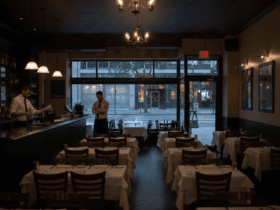Navigating the bustling and ever-evolving landscape of the restaurant industry can be a thrilling yet challenging endeavor, especially for new restaurant managers. Whether you’re overseeing a cozy bistro, a fast-food joint, or a high-end dining establishment, the role of a restaurant manager is multifaceted and critical for the success of the business. This blog post aims to equip you with 10 essential tips to enhance your management skills, optimize your team’s performance, and ultimately, delight your customers. For restaurant owners, understanding these insights is equally vital as it helps in selecting and nurturing the right talent to lead your culinary ventures.
Following are 10 actionable tips that new restaurant managers can utilize
1. Understanding the Scope of Your Role

As a restaurant manager, your role extends beyond mere supervision. It’s about creating a positive work environment, understanding each staff member’s strengths and weaknesses, and leading by example. Managing day-to-day operations includes meticulous attention to detail, from scheduling shifts to ensuring the quality of food and service. Understanding the different types of managers in a restaurant, such as kitchen managers or floor managers, can help you delegate tasks more effectively and ensure smooth operations.
2. Restaurant Managers Should Set Clear Goals:
Effective goal setting is not just about broad objectives like increasing profits or improving customer service. It involves specific, measurable, achievable, relevant, and time-bound (SMART) goals. For instance, setting a goal to reduce food waste by 10% within three months is a clear and measurable objective. Regularly reviewing these goals and adjusting strategies to achieve them is crucial for continuous improvement.
Must Read: How To Conduct The Perfect Restaurant Industry Analysis For Your Restaurant in 2024
3. Investing in Learning:

The restaurant industry is constantly evolving, so staying informed and educated is key. This could involve attending workshops, enrolling in hospitality management courses, or participating in webinars. Reading books specifically tailored for restaurant managers can provide insights into effective management strategies, customer service excellence, and financial management. Joining professional associations offers networking opportunities and access to a wealth of industry knowledge.
4. Staffing and Team Management:
Building a cohesive team is vital. This involves not only hiring the right number of managers and staff but also ensuring they are well-trained and motivated. Recognizing and rewarding staff performance can boost morale and productivity. Effective communication is key – regular team meetings and open feedback channels help in addressing issues promptly and keeping everyone aligned with the restaurant’s goals.
5. Restaurant Managers Should Prioritize Customer Experience:

Customer satisfaction is paramount in the hospitality industry. This involves not just ensuring the quality of food and service but also managing customer expectations and handling complaints gracefully. Training staff in customer service skills, such as effective communication and conflict resolution, is essential. Creating a welcoming atmosphere and a memorable dining experience can turn first-time visitors into regular patrons.
6. Developing Financial Acumen:
A strong understanding of the financial aspects is crucial for making informed decisions that affect the restaurant’s profitability. This includes budgeting, controlling costs, managing inventory, and understanding profit margins. Regularly reviewing financial statements helps in identifying trends and areas for improvement. It’s also important to stay informed about market conditions and adjust pricing strategies accordingly.
Must Read: Importance of Keeping Portion Sizes Consistent for Restaurants in 2024
7. Embracing Technology:

In today’s digital age, leveraging technology can give your restaurant a competitive edge. This could be through implementing a state-of-the-art POS system, using inventory management software, or adopting online reservation and ordering systems. Staying updated with the latest technological advancements and analyzing data collected from these systems can lead to more strategic decision-making.
8. Restaurant Managers Must Ensure Health and Safety Compliance:
Maintaining high standards of hygiene and safety is not just a legal requirement but also crucial for building customer trust. Regular training sessions on health and safety, including food handling and emergency procedures, are essential. Conducting regular audits and inspections ensures compliance with health and safety regulations and can prevent potential issues.
9. Marketing and Promotion:

Developing and implementing effective marketing strategies is key to attracting and retaining customers. This might include social media marketing, email campaigns, or loyalty programs. Collaborating with your team to come up with creative promotional ideas can help increasing visibility and attracting different customer segments. Monitoring the effectiveness of these strategies and adapting them based on customer feedback and market trends is important.
10. Restaurant Managers Must Foster Continuous Improvement:
The willingness to receive and act on feedback is essential for growth. This could involve regular customer surveys, staff feedback sessions, or analyzing online reviews. Continuously seeking ways to improve, whether it’s updating the menu based on customer preferences, enhancing service quality, or renovating the dining space, can lead to a better customer experience and increased business success.
In the dynamic world of restaurant management, staying informed, adaptable, and proactive are the keys to success. These 10 tips provide a foundation for new restaurant managers to build upon and for restaurant owners to understand the qualities to look for in their management team. Embrace these challenges and opportunities, and watch as your restaurant thrives under effective leadership and management.









Leave a Reply